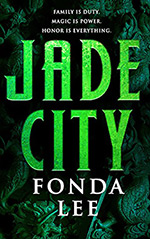
![]() Arifel
Arifel
1/15/2018
![]()
A third of the way into Jade City, I found myself feeling sick to my stomach with fear. One of Kaul siblings, the leaders of one of Janloon's biggest magically enhanced gang families, has just been challenged by the champion of a rival and needs to respond with overwhelming force. Other characters object, but are overruled - in the brutal logic of the world the Kauls live in, this is all they can do, even if it risks bringing down their entire family if they lose. The ten or so Kindle pages for this to resolve were some of the longest reading of my life.
That's the magic that Fonda Lee brings to Jade City, an epic fantasy set in a modernised world where ancient families wield magic powers through training to control a particular type of jade found only on their island home. Most of the main characters in this book come from the aforementioned Kaul family, who lead the No Peak clan: there's young Pillar (leader) Lan, trying to establish himself while dealing with forces still loyal to his retired, ill grandfather; his aggressive younger brother and Horn (general) Hilo, whose skill in developing individual relationships does not extend to a general understanding of politics; his estranged sister Shae, who has just returned to Janloon after following a boyfriend abroad to study two years previously and is trying to stay out of the family business; and adoptive youngest "cousin" Anden, still in his last year of school and attempting to overcome prejudice both from being mixed-race and from his mother's highly stigmatised death from jade overexposure. The clan as a whole are dealing with an increasingly strong and belligerent rival, the Mountain clan, whose quiet machinations to control the production of jade and of a new drug which allows foreigners to harness its power are just beginning to be felt.
While "20th-century-analogue Asian City undergoing a post-war economic miracle" is hardly a common setting for epic fantasy, the level of detail in the world of Jade City, and the sense of complex history and culture behind the characters and their actions, more than justifies the label. As noted above, one of the book's greatest strengths is how gripping it is - its been a while since a book made me this viscerally fearful for the people in it - and the narrative goes along at a strong pace from start to finish. The other impressive aspect is how successfully Fonda Lee's characters encouraged me to think like them. Without spoiling anything at all in the plot, there is a point around halfway through where an opportunity is taken by one character when I felt strongly (and I'm sure this was intended) that this person wasn't suitable and another character should have had it instead. Instead of glossing over that discrepancy, or resolving it in the second character's favour in some messy pyrrhic victory later down the line (which is what I expected to happen), the apparent unfairness is quickly raised and just as soon dismissed in text by another character, who makes it clear why, in the world of Janloon, things had to turn out in a particular way. Most characters are very morally grey, but in a way where it's clear they're always trying to do "good" - it's just that all of their actions are so tied up in a causal web of obligations and expected behaviour and far-reaching consequences that "good" sometimes ends up being "do an honourable murder". It's such a testament to Fonda Lee's skills that these constraints don't feel artificial in context, and I always believed the characters were acting in the ways they felt they had to act, even when as a reader I didn't agree with their logic.
This is a book which takes a lot of its narrative cues and setup from media I associate too much with shitty masculinity to ever watch - things like the Godfather, and that other show that former male "friends" loved to quote to each other over dinner when they wanted to exclude me from conversation. It doesn't shy away from showing a highly patriarchal society, albeit one where women can break in when they show themselves to be overwhelmingly more competent and/or ruthless than their male counterparts. Again, this was handled well, with casual misogyny (and racism, and occasional homophobia) present among the characters but not at all condoned by the text, and no mentions of sexual violence or lingering descriptions of the particular victimisation of women in the war between the gangs (although as most of the Green Bones trained for fighting are men, and there's a pretty significant body count involved, the fighting clearly does have gendered impacts). This is hardly a comfort read to begin with, so I didn't mind reading about discrimination alongside transnational drug trading and arms races and the like - but if you like your fantasy to include a critical mass of unquestioned fighting women at all levels, this isn't the book to give you that.
In short, this book is excellent and well worth your time if you enjoy morally ambiguous character driven epic fantasy, even if the list of influences leaves you a bit cold. I'm eagerly awaiting the next volume of this unusual series.
http://adrijoyreads.wordpress.com